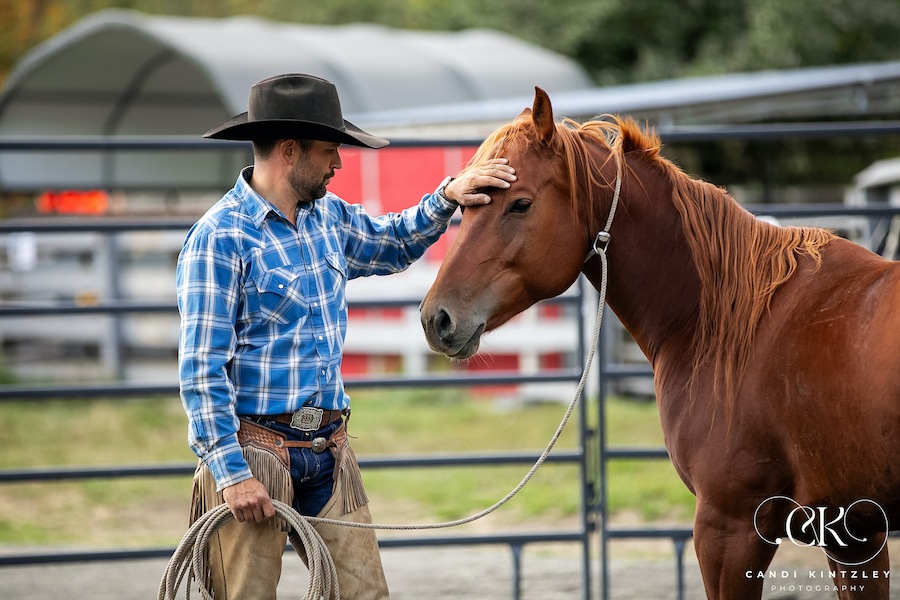For us, it begins in a muddy field.
Harissa stands with her herd, four mares total, perhaps aunts or cousins or sisters, bound if not by blood then by the unfortunate nature of their circumstances. They squelch through the muck as they approach us, curious, wary. While some can be haltered, none allow themselves to be led, and we must usher them to the trailer loose, a 16-legged unit careening down a panel chute towards a new life.
At SAFE, we make slow introductions, hoping to work a tangle from a mane and curry some mud from a leg. For the most part, they are shy, hesitant – out of practice with being handled, or perhaps mostly new to it. They must get to know us just as we get to know them.
Harissa, however, already knows us.
Not us, who stand before her now, but Us, meaning our kind, meaning humans. She knows us, and she could do without. Some part of Harissa learned that fight was preferable to flight, and she is not afraid to show us her teeth.
There is sadness that accompanies rescue stories. The bag of bones horse, the worm-infested horse, the horse with the feet that have started to curl in on themselves. But there is arguably more sadness in a story like Harissa’s, the horse who, through whatever fault of Ours, learned that the best option was to grow fangs.
Harrisa is not a bad horse, she is a supremely sad one.
Gentling horses is not without its difficulties even in the best of cases, but for a horse like Harissa, the task at hand seems almost insurmountable. The first of many sessions in the round pen show us this. She is herdbound, pawing great trenches in the sand when removed even 50 feet from her friends, unable to find any sort of peace. She pushes into pressure with an intensity that is dangerous both for her and the person on the end of her emotional (or physical) line. She strikes out, quick and unpredictable.
In amongst the work, we give her time.
She eats three meals a day now. Her feet, overlong, are as untouchable as the rest of her, but begin to shave themselves down on the hard ground of her paddock. We pick the manure from her pen in the mornings, and again in the afternoons. We keep a watchful eye on her while we do, but for the most part, we largely ignore her. There is no presumption here, no expectation.
Around her, her herdmates progress through the motions. They work up to wearing halters, to being brushed all over, to having their hooves seen to. They leave the paddock, they meet the vet, they slide more firmly into domesticity. Some begin to wear saddles – some even become riding horses. Meanwhile, Harissa is given space.
When Joel comes, he works with her. Such has been the case since the very beginning. Joel in the lion’s den on that first day, dodging her teeth, looking for a positive change to leave her on. Ask any one of us, back in May, and we would be honest in telling you it seemed near impossible.
But with each visit, there is evidence of cracks in her facade, ways in which we are getting through to her. Even something as simple as stopping at the opposite side of the round pen from where her friends are, or giving to pressure in the smallest of increments are big changes, a new foundation. Brick by brick, we help Harissa to rebuild — hard work the material, time and patience the mortar.
Time, work.
Then, there comes a day when Harissa feels the slack leave the rope, and searches for a way to reintroduce it.
More time, more Work.
Then, there comes a day when Joel slides his hand down Harissa’s face and she does not pin her ears.
Followed closely by a day where he can slip his hands around her neck and put her in a halter, work with her on a shorter line, touch her with a flag. All milestones that, for some horses, take just days, hours, even minutes. But with Harissa, time stands still. Her journey has no end date.
Work, time.
We can now approach her in her paddock, and she will meet us half-way. She lets us comb out the tangles from her mane – finally – and pet down her legs. Her eyes are soft as we stroke her cheek, and we tell her that the dab of white in the middle of her forehead very much resembles a heart. She sees the vet (but that’s a story for another day), and meets the farrier. She grows a little more domestic from one month to the next.
We are still cautious. There are parts of Harissa which remain that are mistrustful of people, of Us. Hers is not a blank slate, and there is writing on the wall that has left a deep imprint. There is no switch to be flipped overnight, no sudden rearranging of a personality. Just gradual change, facilitated by, what other than, work and time.
But when the road ahead begins to look particularly long, we look back, and we see how far she has already come.
Today, Harissa’s journey continues. We take it step by step, day by day, the way we have from the beginning.


